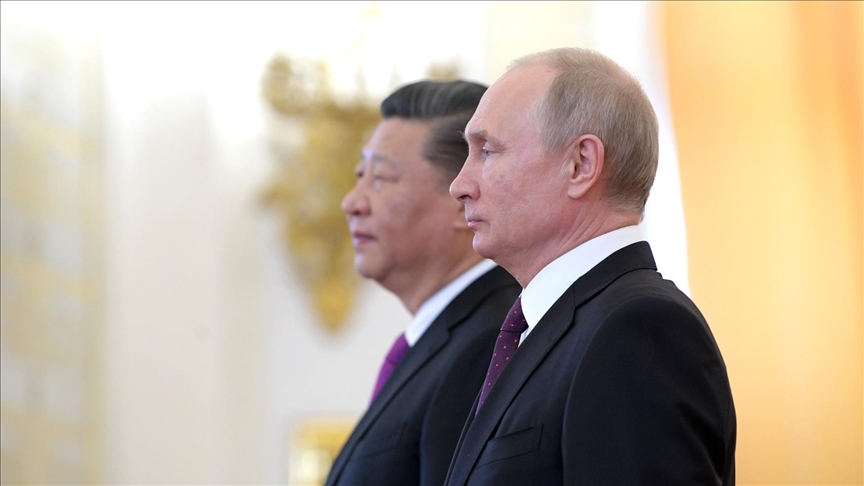ISTANBUL
Chinese President Xi Jinping’s three-day official visit to Russia this week could boost the bilateral relations between Beijing and Moscow but China’s peace plan will not end the war in Ukraine any time soon, according to experts.
Both sides agreed on cooperation in various areas “deepening the strategic partnership of coordination for the new era,” said a statement issued after the meeting.
As the two bigwigs of the East cozy up, China-US relations have deteriorated with US Secretary of State Antony Blinken postponing indefinitely his visit to China due to a Chinese balloon flying over the country.
Xi’s visit happened at a time when Russia and China both strongly oppose the American-led new world.
Speaking to Anadolu via e-mail, Amanda Hsiao, Crisis Group’s senior analyst for China, said that the deepening economic relationship between Russia and China is and will continue to be a big piece of the journey forward.
“Xi’s decision to visit Moscow as his first trip overseas after securing a third term is meant to send a clear signal of the steadfastness of China-Russia ties despite Putin’s increasing international isolation and the attendant costs to China’s international image,” she added.
Alicia Garcia Herrero, who is a senior fellow at European think-tank Bruegel and the chief economist for Asia Pacific at French bank Natixis, believes that Xi’s visit to Russia is a sign of strength for China and a sign of weakness for Russian President Vladimir Putin.
“No matter how Putin may read it, it’s basically that Xi Jinping is imposing the peace plan in Ukraine. Whether Putin will really accept it at the very end is a different issue,” she said in an e-mail.
China in February proposed a 12-point peace plan for dealing with the Russia-Ukraine war. Putin said that this plan could be utilized as the basis for the peaceful settlement of the Ukraine war. He added that Russia is “open to talks” for peace in the Ukraine conflict.
However, experts believe otherwise.
“China’s peace plan is a list of general positions rather than a roadmap for how to get the two parties to sit down and start talking,” Hsiao said.
“Beijing wants to promote an image of itself as a constructive actor for peace because it helps to fend off Western accusations that it is too supportive of Russia.”
Selcuk Colakoglu, a founding director of the Turkish Center for Asia Pacific Studies, said that China’s primary goal in the Ukraine crisis is to prevent Russia’s exclusion from the international system and to ensure the continuation of a multipolar policy vis-a-vis Western countries.
“Therefore, it is unacceptable for China to weaken Russia and push it out of the world political system.”
New gas pipeline to China
Russia is “a strategic supplier” of oil and gas, including liquefied natural gas (LNG), coal, and electricity to China, according to Putin.
Regarding the gas pipeline project, the joint statement released after the two leaders’ meeting says: “The two sides will work together to promote studies and consultations on the new China-Mongolia-Russia natural gas pipeline project.”
Russia previously said that Nord Stream 2 would be “replaced” by an alternative gas pipeline, Power of Siberia 2. The proposed pipeline will deliver 50 billion cubic meters of natural gas from the Yamal reserves in west Siberia to China.
According to European expert Herrero, China expects the acceptance of its peace deal as a precursor to the pipeline.
“I knew it is not a new deal but it’s a pipeline that has been discussed at length and that will help Putin divert more gas, basically connect the western pipes with the eastern pipes, which would help reduce Putin’s dependence on Europe for gas exports. But this offer will have a price. The price is to accept the peace deal that Xi Jinping is offering Putin,” Herrero said.
She also stressed the importance of cooperation in the Arctic for China.
“The cooperation is really beneficial for China,” she says, as China has been regarded as Russia’s biggest emerging partner in the Arctic.
The Northern Sea Route in the Arctic is also a shorter alternative for the Russian trade route between Europe and Asia.
Turkey-based expert Colakoglu said for Russia it is not possible to sell natural gas to India and China for geostrategic reasons due to the Ukraine war.
“On the other hand, China attaches great importance to diversifying its energy resources and does not want to become overly dependent on a single source.”
China’s relationship with Russia driven by its desire to balance US pressure
Expert Hsiao highlighted that China’s decision to deepen its relationship with Russia is primarily driven by its desire to “balance against US pressure.” “China wants to ensure it has a reliable partner in its corner should competition with the US become even more acute.”
“It is hard to see China on its own playing a role in resolving the Ukraine conflict given its public lean toward Russia,” she added.
Asked how Russia’s war in Ukraine affected Beijing’s role in global politics, Hsiao said that this situation has created “a number of dilemmas” for China, increasing the costs of its strategic partnership with Moscow.
Warning of spillover of the Ukraine conflict, Hsiao said: “This has helped to accelerate discussions and decisions to increase defense budgets and to strengthen military cooperation with the US, creating a more difficult environment for China in its own periphery.”

